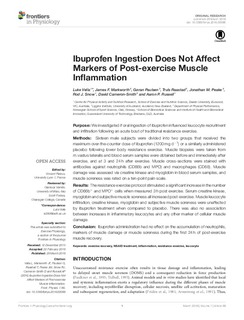| dc.contributor.author | Vella, Luke | |
| dc.contributor.author | Markworth, James F. | |
| dc.contributor.author | Paulsen, Gøran | |
| dc.contributor.author | Raastad, Truls | |
| dc.contributor.author | Peake, Jonathan M. | |
| dc.contributor.author | Snow, Rod J. | |
| dc.contributor.author | Cameron-Smith, David | |
| dc.contributor.author | Russel, Aaron P. | |
| dc.date.accessioned | 2017-01-23T09:28:18Z | |
| dc.date.available | 2017-01-23T09:28:18Z | |
| dc.date.issued | 2016-03-29 | |
| dc.identifier.citation | Frontiers in Physiology. 2016, 7, 1-9. doi: https://doi.org/10.3389/fphys.2016.00086 | nb_NO |
| dc.identifier.uri | http://hdl.handle.net/11250/2427997 | |
| dc.description.abstract | Purpose: We investigated if oral ingestion of ibuprofen influenced leucocyte recruitment and infiltration following an acute bout of traditional resistance exercise Methods: Sixteen male subjects were divided into two groups that received the maximum over-the-counter dose of ibuprofen (1200mg d−1) or a similarly administered placebo following lower body resistance exercise. Muscle biopsies were taken from m.vastus lateralis and blood serum samples were obtained before and immediately after exercise, and at 3 and 24 h after exercise. Muscle cross-sections were stained with antibodies against neutrophils (CD66b and MPO) and macrophages (CD68). Muscle damage was assessed via creatine kinase and myoglobin in blood serum samples, and muscle soreness was rated on a ten-point pain scale. Results: The resistance exercise protocol stimulated a significant increase in the number of CD66b+ and MPO+ cells when measured 3 h post exercise. Serum creatine kinase, myoglobin and subjective muscle soreness all increased post-exercise. Muscle leucocyte infiltration, creatine kinase, myoglobin and subjective muscle soreness were unaffected by ibuprofen treatment when compared to placebo. There was also no association between increases in inflammatory leucocytes and any other marker of cellular muscle damage. Conclusion: Ibuprofen administration had no effect on the accumulation of neutrophils, markers of muscle damage or muscle soreness during the first 24 h of post-exercise muscle recovery. | nb_NO |
| dc.language.iso | eng | nb_NO |
| dc.publisher | Frontiers Media | nb_NO |
| dc.subject | exercise recovery | nb_NO |
| dc.subject | NSAID treatment | nb_NO |
| dc.subject | inflammation | nb_NO |
| dc.subject | resistance exercise | nb_NO |
| dc.subject | leucocyte | nb_NO |
| dc.title | Ibuprofen ingestion does not affect markers of post-exercise muscle inflammation | nb_NO |
| dc.type | Journal article | nb_NO |
| dc.type | Peer reviewed | nb_NO |
| dc.subject.nsi | VDP::Medisinske Fag: 700::Basale medisinske, odontologiske og veterinærmedisinske fag: 710 | nb_NO |
| dc.source.journal | Frontiers in Physiology | nb_NO |
| dc.identifier.doi | https://doi.org/10.3389/fphys.2016.00086 | |
| dc.description.localcode | Seksjon for fysisk prestasjonsevne / Department of Physical Performance | nb_NO |
